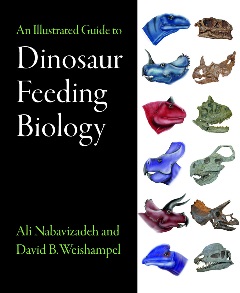 Ali Nabavizadeh, PhD, is co-author of the newly-published book, An Illustrated Guide to Dinosaur Feeding Biology. The book presents a chronological narrative tracing more than a century of findings related to how dinosaurs ate. The result is a 353-page, 14-chapter chronicle of paleontologic discovery, with 250 illustrations, many in full color, to drive home the information. The authors hope it will be a valuable resource to researchers and students interested in dinosaurs and animal scientists interested in feeding anatomy and biology.
Ali Nabavizadeh, PhD, is co-author of the newly-published book, An Illustrated Guide to Dinosaur Feeding Biology. The book presents a chronological narrative tracing more than a century of findings related to how dinosaurs ate. The result is a 353-page, 14-chapter chronicle of paleontologic discovery, with 250 illustrations, many in full color, to drive home the information. The authors hope it will be a valuable resource to researchers and students interested in dinosaurs and animal scientists interested in feeding anatomy and biology.
Read More
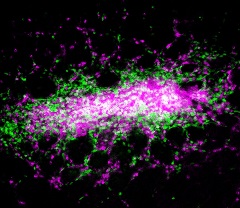 Yersinia bacteria cause a variety of human and animal diseases, the most notorious being the plague, caused by Yersinia pestis. A relative, Yersinia pseudotuberculosis, causes gastrointestinal illness and is less deadly, but naturally infects both mice and humans, making it a useful model for studying its interactions with the immune system.
Yersinia bacteria cause a variety of human and animal diseases, the most notorious being the plague, caused by Yersinia pestis. A relative, Yersinia pseudotuberculosis, causes gastrointestinal illness and is less deadly, but naturally infects both mice and humans, making it a useful model for studying its interactions with the immune system.
A new study of Y. pseudotuberculosis, led by a team from the laboratory of Dr. Igor Brodsky and published in Nature Microbiology, demonstrates that, in response to infection, the host immune system forms small, walled-off lesions in the intestines called granulomas. It’s the first time these organized collections of immune cells have been found in the intestines in response to Yersinia infections.
Somewhat paradoxically, these granulomas—while key in controlling infection by walling off the infectious agent—also sustain a population of the pathogen within those walls. A deeper understanding of the molecular pathways that regulate this immune response could one day offer inroads into host-directed immune therapies, by which a drug could tip the scales in favor of the host immune system, unleashing its might to fully eradicate the bacteria rather than simply corralling them in granulomas.
Read More
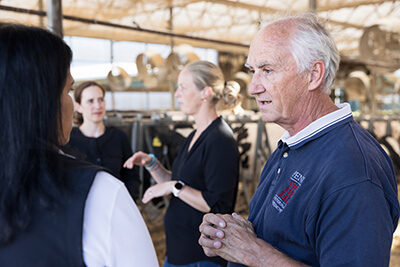
Thomas D. Parsons, VMD, PhD, co-leads the Penn Regenerative Agricultural Alliance, together with Mark Alan Hughes of the Kleinman Center for Energy Policy. Regenerative agriculture distinguishes itself by practices that don’t just avoid degradation of the environment but, in fact, improve soil and ecosystem health.
Over the last year, Parsons and Hughes have gathered experts in soil health, such as Dr. Zhengxia Dou from Penn Vet and Alain Plante from Penn Arts & Sciences, to turn attention to how agriculture can incorporate best practices on farms and reinvigorate degenerated soils. In work with Ellen Neises and colleagues at Penn’s Weitzman School of Design, they are also exploring the use of riparian buffers on farms, areas along streams or other waterways that are planted with trees, shrubs, and other plants to protect water quality and provide wildlife habitat. They’re working with Penn Engineering’s Peter Psarras at the Clean Energy Conversions Lab to consider the role of farms in carbon capture, as well as Engineering’s Cherie Kagan and Rahul Mangharam to collaborate on technological applications for regenerative agriculture. And they’ve engaged Tom Daniels and Nicholas Pevzner of Weitzman in discussions about how the renewable energy industry—think solar farms—poses both a challenge and an opportunity to traditional farms.
Read More
From Outbreaks to Breakthroughs: Tackling Infectious and Zoonotic Diseases
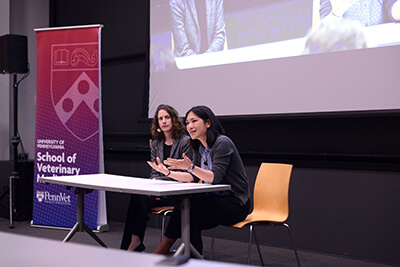 Penn Vet’s Institute for Infectious and Zoonotic Diseases (IIZD) held its inaugural symposium on March 23, 2023. Keynote speaker, Dr. Katherine J. Wu, an infectious disease researcher turned staff writer for The Atlantic, kicked off the event with a discussion of her approaches and the challenges to reporting on infectious diseases during a pandemic.
Penn Vet’s Institute for Infectious and Zoonotic Diseases (IIZD) held its inaugural symposium on March 23, 2023. Keynote speaker, Dr. Katherine J. Wu, an infectious disease researcher turned staff writer for The Atlantic, kicked off the event with a discussion of her approaches and the challenges to reporting on infectious diseases during a pandemic.
Read More
Student Research Day 2023
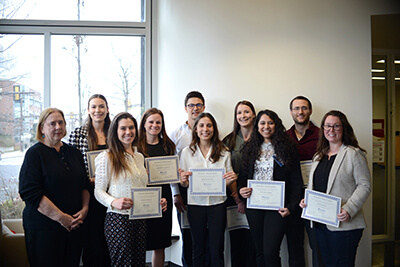 Penn Vet’s Student Research Day was held on Friday, March 17, 2023, in the Vernon and Shirley Hill Pavilion. The organizing committee was led by Dr. Jennifer Punt and included faculty members Elizabeth Lennon, Michael May, Elizabeth Woodward, and Phillip Scott, and members of the Student Research Club, Nimisha Pattada and Stephanie Sila.
Penn Vet’s Student Research Day was held on Friday, March 17, 2023, in the Vernon and Shirley Hill Pavilion. The organizing committee was led by Dr. Jennifer Punt and included faculty members Elizabeth Lennon, Michael May, Elizabeth Woodward, and Phillip Scott, and members of the Student Research Club, Nimisha Pattada and Stephanie Sila.
Dean Andrew Hoffman kicked off the day’s events with an introduction that drew upon four thought-provoking books dealing with the topics of curiosity, the geography of great leaps forward, different types of intelligence, and some of the positive aspects of stress and anxiety. Seven students delivered oral presentations (Rebecca Brisman, Katherine Morucci, Nimisha Pattada, Rachel Tevere, Jaclyn Carlson, Elisabeth Lemmon, and Martha Stone), and 30 posters were presented. Elaine Ostrander, PhD, Chief and Distinguished Investigator, Cancer Genetics and Comparative Genomics Branch, National Human Genome Research Institute, National Institutes of Health, delivered a fascinating keynote presentation entitled Genetics of Cancer, Morphology and Aging in Dogs.
Academic prizes were awarded for three poster presentations (Andrew Dunlap, Philip Hicks, and Corisa Quincey), and all seven student oral presentations. This year’s academic prizes for oral and poster presentations were named for Professor Emeritus Richard O. Davies. Faculty judges for the abstracts and posters included Drs. Matthew Atherton, Elizabeth Lennon, Frank Luca, Michael May, Jennifer Punt, and Elizabeth Woodward.
Student Research Day also included a ‘poster slam’ competition. Each poster presenter provided a one-minute video and a single slide to introduce their poster. These introductions were compiled into a video that played on a loop in the Billhardt Auditorium during the poster session. Prizes were awarded in three categories: Clear, Creative, and Crowd Favorite. Winners were chosen by popular vote and included Jessica DiStefano (Clear category); Kate Marciano (Creative category); and Corisa Quincey (Crowd Favorite category).
Student Research Day presentations and photos are available for online viewing.